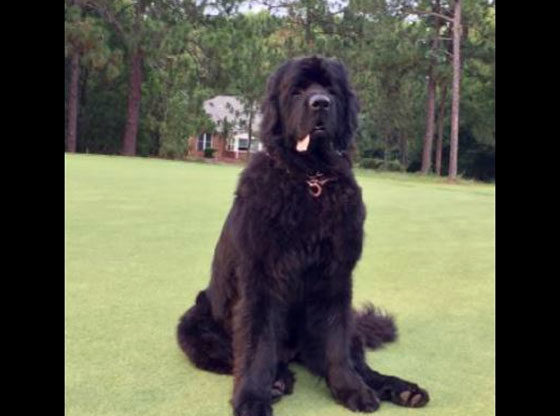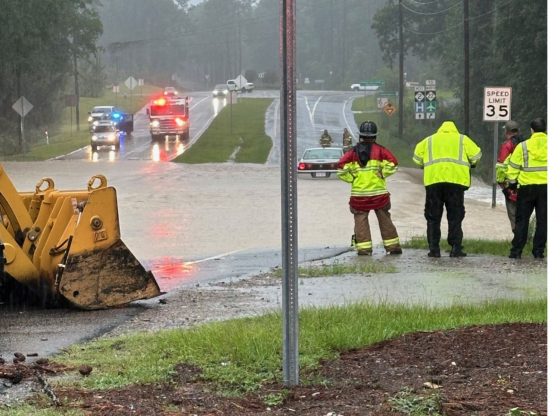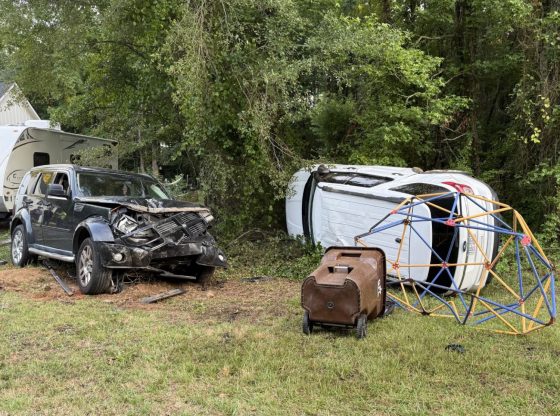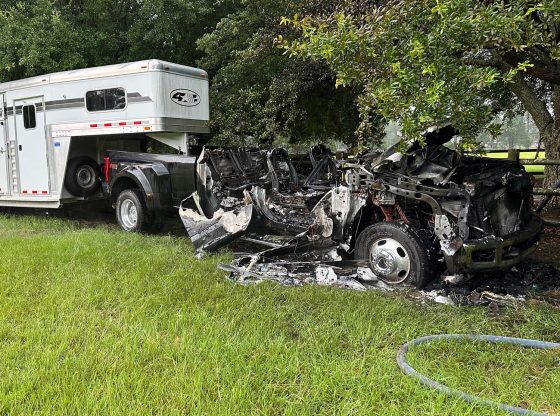On August 11, the North Carolina Department of Health and Human Services received its first reported case of a confirmed COVID-19 positive dog in North Carolina.
As it turns out, the dog, an 8-year-old Newfoundland named River, and his owner were residents of the Seven Lakes North community.
On the morning of Monday, August 3, River’s owner, who wishes to remain anonymous, left for work as she typically would on any other day. She noticed that River seemed a little more tired than usual, but she dismissed it, attributing it to a long weekend full of swimming and play that River had just spent at nearby Lake Sequoia.
When she returned home for lunch, River’s condition had worsened, so she rushed him to the local veterinarian’s office. Upon arrival, River’s symptoms were assessed, and it was clear that he was in respiratory distress. River was feverish and his breathing was labored. A chest x-ray was ordered, and samples of blood were taken.
Preliminary test results pointed toward a possible respiratory infection, at which point, River was referred to the NC State Veterinary Hospital in Raleigh for further testing and treatment. NC State Veterinary Hospital’s diagnostic laboratory collected samples from River and they were tested for SARS-CoV-2, the virus that causes COVID-19 in humans.
The samples were then sent to the National Veterinary Services Laboratories (NVSL) for confirmatory testing. Those tests confirmed a positive result; indicating a confirmed SARS-CoV-2 case per the national case definition developed by the United States Department of Agriculture.
Sadly, River passed away later that evening, succumbing to his acute illness.
“His heart was still beating, but his lungs had stopped functioning,” said River’s owner. “CPR was administered but they couldn’t get his lungs to start working again and there was no ventilator available for him.”
Although he was considered a senior dog by age standards, River was vibrant and very healthy up to that fateful day.
In fact, just a month prior, River had a complete work-up at his local vet’s office and was given a clean bill of health.
River’s breed, the Newfoundland or “Newfie” as they are called, are sturdy dogs that can weigh anywhere from 100-150 pounds and stand nearly 28 inches at the shoulder. River was no exception, he towered over other dogs in his neighborhood.
“River was a gentle giant,” said his owner. “Kids and adults flocked to him because of his size and sweet nature.”
Canadian fisherman have long relied on Newfoundlands as working dogs who specialized in dramatic water rescues. The average Newfoundland is strong enough and has the lung capacity to save a full-grown man from drowning. It has been said that what the Saint Bernard is to the Alps, the Newfoundland is to the icy waters of the North Atlantic.
The breed is still considered the premium water-rescue dog and is employed in that role the world over. River’s owner theorizes that it was River’s appearance and gentle disposition that led to his COVID-19 infection and ultimate demise.
“So many people were attracted to him, everyone always wanted to hug and pet him,” she says. “While we may never know for certain, I’m pretty confident this is how River got this terrible virus.”
There is still much to learn about COVID-19, it appears that it can spread from people to animals in some situations, especially after close contact with a person sick with COVID-19.
To date, approximately 30 animals have been reported to be infected with the virus here in the United States. The first US case of an animal testing positive for COVID-19 was a tiger at the Bronx Zoo in New York on April 4.
“Based on the information available, the risk of animals spreading the virus to people is considered to be low,” said Dr. Carl Williams, State Public Health Veterinarian.
“There is no indication at this time that dogs can transmit the virus to other animals, so there is no justification in taking measures against companion animals that may compromise their welfare,” said State Veterinarian Dr. Doug Meckes.
According to the CDC, there is currently no evidence that pets play a significant role in spreading the SARS-CoV-2 virus.
However, until we learn more about how this virus affects animals, the CDC recommends that everyone treat pets as you would other human family members to protect them from a possible infection.
Because there is a small risk that people with COVID-19 could spread the virus to animals, pet owners should limit their pet’s interaction with people outside their household.
• Keep cats indoors when possible and do not let them roam freely outside.
• Walk dogs on a leash at least 6 feet away from others.
• Avoid public places where a large number of people gather.
• Do not put a mask on pets. Masks could harm your pet.
If you are sick with COVID-19 (either suspected or confirmed by a test), you should restrict contact with your pets and other animals, just like you would with people.
• When possible, have another member of your household care
for your pets while you are sick.
• Avoid contact with your pet including petting, snuggling, being
kissed or licked, sharing food, and sleeping in the same bed.
• If you must care for your pet or be around animals while you are
sick, wear a mask and wash your hands before and after you
interact with them.
River’s owner wants his story to be a cautionary tale. “In the spirit of his life-saving breed, I hope by sharing his story it will reduce the spread of this terrible disease,” she says. “If River’s story could even help one other dog from getting sick, his life-saving spirit will live on.”
Courtesy Photo/Contributed.



















